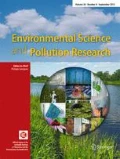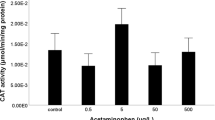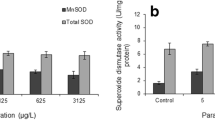Abstract
Over time, many pollutants of anthropogenic origin have caused the contamination of aquatic ecosystems. Among several characteristics, these compounds can reach the trophic chain, causing deleterious interactions with the biota. Pharmaceutical substances can be included in this scenario as emerging contaminants that reach the aquatic environment because of direct human and veterinary usage, and release by industrial effluents, as well as through domestic dumping of surplus drugs. The effects of these compounds on exposed organisms have been studied since the 1990s, but ecotoxicological data for such chemicals are still scarce especially concerning aquatic organisms from tropical regions. Paracetamol and propranolol were selected for this study since they are frequently found in surface waters. Paracetamol is a drug used as analgesic and antipyretic, while propranolol, a β-blocker, is used in the treatment of hypertension. The objective of this study was to assess the toxic effects of these substances on the neotropical freshwater fish Phalloceros harpagos after acute (96 h) and chronic (28 days) exposures. In order to understand the effects of these drugs on P. harpagos, biochemical markers were selected, including the enzymes involved in oxidative stress, xenobiotic metabolism, and neurotransmission (catalase, glutathione-S-transferase, and cholinesterase activities, respectively). After acute exposure, no significant alterations were observed for catalase activity, suggesting the absence of oxidative stress. On the contrary, significant alterations in glutathione-S-transferases activity were described for the higher concentrations of both pharmaceuticals after acute exposure. In addition, acute exposure to paracetamol caused a significant increase of cholinesterase activity. None of the tested pharmaceuticals caused significant changes in catalase or cholinesterase activities after chronic exposure. Glutathione S-transferases activity was significantly increased for propranolol following chronic exposure, indicating the potential involvement of phase II detoxification pathway.


Similar content being viewed by others
References
Aebi H (1984) Catalase in vitro. Methods Enzymol 6:105–121. https://doi.org/10.1016/S0076-6879(84)05016-3
Alkondon M, Ray A, Sen P (1986) Tissue cholinesterase inhibition by propranolol and related drugs. J Pharm Pharmacol 38:848–850. https://doi.org/10.1111/j.2042-7158.1986.tb04509.x
Américo JHPA, Isique WD, Minillo A, Carvalho SL (2012) Drugs at a sewage treatment plant in the center-west region of Brazil and the risks to water resources. Brazilian J Water Res 17(3):61–67 (in Portuguese)
Andreozzi R, Rafaelle M, Nicklas P (2003) Pharmaceuticals in STP effluents and their solar photodegradation in aquatic environment. Chemosphere 50:1319–1330. https://doi.org/10.1016/S0045-6535(02)00769-5
Antunes SC, Freitas R, Figueira E, Gonçalves F, Nunes B (2013) Biochemical effects of acetaminophen in aquatic species: edible clams Venerupis decussata and Venerupis philippinarum. Environ Sci Pollut Res 20(9):6658–6666. https://doi.org/10.1007/s11356-013-1784-9
Archer E, Petrie B, Kasprzyk-Horden B, Wolfaardt GM (2017) The fate of pharmaceuticals and personal care products (PPCPs), endocrine disrupting contaminants (EDCs), metabolites and illicit drugs in a WWTW and environmental waters. Chemosphere 174:437–446. https://doi.org/10.1016/j.chemosphere.2017.01.101
Ashton D, Hilton M, Thomas KV (2004) Investigating the environmental transport of human pharmaceuticals to streams in the United Kingdom. Sci Total Environ 333:167–184. https://doi.org/10.1016/j.scitotenv.2004.04.062
Batt AL, Kostich MS, Lazorchak JM (2008) Analysis of ecologically relevant pharmaceuticals in wastewaters and surface water using selective solid-phase extraction and UPLC-MS/MS. Anal Chem 80:5021–5030. https://doi.org/10.1021/ac800066n
Bolong N, Ismail AF, Salim MR, Matsuura T (2009) A review of the effects of emerging contaminants in wastewater and options for their removal. Desalination 239(1–3):229–246. https://doi.org/10.1016/j.desal.2008.03.020
Bradford MM (1976) A rapid and sensitive method for the quantitation of microgram quantities of protein utilizes the principle of protein-dye binding. Anal Biochem 72(1–2):248–254. https://doi.org/10.1016/0003-2697(76)90527-3
Brandão FP, Pereira JL, Gonçalves F, Nunes B (2011) The impact of paracetamol on selected biomarkers of de Mollusc species Corbicula fluminea. Environ Toxicol 29:74–83. https://doi.org/10.1002/tox.20774
Brandão FP, Rodrigues S, Castro BB, Gonçalves F, Antunes SC, Nunes B (2013) Short-term effects of neuroactive pharmaceutical drugs on fish species: biochemical and behavioural effects. Aquat Toxicol 144-145:218–229. https://doi.org/10.1016/j.aquatox.2013.10.005
Campanha MC, Awan AT, de Sousa DN, Grosseli GM, Mozeto AA, Fadini PS (2015) A 3- year study on occurrence of emerging contaminants in an urban stream of São Paulo state of Southeast Brazil. Environ Sci Pollut Res Int 22(10):7936–7947. https://doi.org/10.1007/s11356-014-3929-x
Carvalho MF, Pascom ARP, Souza-Júnior PRB, Damacena GN, Szwarcwld CL (2005) Utilization of medicines by the Brazilian population, 2003. Cad Saúde Pública 21:100–108. https://doi.org/10.1590/S0102-311X2005000700011
Coetsier CM, Spinelli S, Lin L, Roing B, Touraud E (2009) Discharge of pharmaceutical products (PPs) through a conventional biological sewage treatment plant: MECs vs PECs? Environ Int 35:787–792. https://doi.org/10.1016/j.envint.2009.01.008
Correia B, Freitas R, Figueira E, Soares AMVM, Nunes B (2016) Oxidative effects of the pharmaceutical drug paracetamol on the edible clam Ruditapes philippinarum under different salinities. Comp Biochem Physiol 179:116–124. https://doi.org/10.1016/j.cbpc.2015.09.006
Correia MA (2014) Drug biotransformation. In: Katzung BG, Masters SB, Trevor AJ (eds) Basic and clinical pharmacology. McGraw-Hill
Das UN (2007) Acetylcholinesterase and butyrylcholinesterase as possible markers of low-grade systemic inflammation. Med Sci Monit 13:214–221
Dash NK, Azam M, Gupta G, Baquer NZ (1990) Effect of chronic administration of propranolol on acetylcholinesterase and 5-hydroxytryptamine levels in rat brain and heart. Biochem Int 22(3):475–482
Daughton CG, Ternes TA (1999) Pharmaceuticals and personal care products in the environment: agents of subtle change? Environ Health Perspect 107(6):907–938
Delwing-de Lima D, Wollinger LF, Casagrande ACM, Delwing F, da Cruz JGP, Wyse ATS, Magro DD–D (2010) Guanidino compounds inhibit acetylcholinesterase and butyrylcholinesterase activities: effect neuroprotector of vitamins E plus C. Int J Dev Neurosci 28(6):465–473. https://doi.org/10.1016/j.ijdevneu.2010.06.008
Ding J, Lu G, Li S, Nie Y, Liu J (2015) Biological fate and effects of propranolol in an experimental aquatic food chain. Sci Total Environ 532:31–39. https://doi.org/10.1016/j.scitotenv.2015.06.002
Ebele AJ, Abdallah MA-E, Harrad S (2017) Pharmaceuticals and personal care products (PPCPs) in freshwater aquatic environment. Emerg Contam 3(1):1–16. https://doi.org/10.1016/j.emcon.2016.12.004
Ellman GL, Courtney KD, Andres V, Featherstone RM (1961) A new and rapid colorimetric determination of acetylcholinesterase activity. Biochem Pharmacol 7:88–95. https://doi.org/10.1016/0006-2952(61)90145-9
Fent K, Weston AA, Caminada D (2006) Ecotoxicology of human pharmaceuticals. Aquat Ecotoxicology 76:122–159. https://doi.org/10.1016/j.aquatox.2005.09.009
Franzellitti S, Buratti S, Valbonesi P, Capuzzo A, Fabbri E (2011) The β-blocker propranolol affects cAMP-dependent signaling and induces the stress response in Mediterranean mussels, Mytilus galloprovincialis. Aquat Toxicol 101(2):299–308. https://doi.org/10.1016/j.aquatox.2010.11.001
Gómez MJ, Martínez Bueno MJ, Lacorte S, Fernández-Alba AR, Agüera A (2007) Pilot survey monitoring pharmaceuticals and related compounds in a sewage treatment plant located on the Mediterranean coast. Chemosphere 66(6):993–1002. https://doi.org/10.1016/j.chemosphere.2006.07.051
Gros M, Petrovic M, Barceló D (2006) Development of a multi-residue analytical methodology based on liquid chromatograph-tandem mass spectrometry (LC-MS/MS) for screening and trace level determination of pharmaceuticals in surface and wastewaters. Talanta 70:678–690. https://doi.org/10.1016/j.talanta.2006.05.024
Guiloski IC, Ribas JLC, Piancini LDS, Dagostim AC, Cirio SM, Fávaro LF, Boschen SL, Cestari MM, Cunha C, Assis HCS (2017) Paracetamol causes endocrine disruption and hepatotoxicity in male fish Rhamdia quelen after subchronic exposure. Environ Toxicol Pharmacol 53:111–120. https://doi.org/10.1016/j.etap.2017.05.005
Habig WH, Pabst MJ, Jakoby WB (1974) Glutathione-S-transferases—the first enzymatic step in mercapturic acid formation. J Biol Chem 249:7130–7139
Ibáñez M, Gracia-Lor E, Bijlsma L, Morales E, Pastor L, Hernández F (2013) Removal of emerging contaminants in sewage water subjected to advanced oxidation with ozone. J Hazard Mater 260:389–398. https://doi.org/10.1016/j.jhazmat.2013.05.023
Joly CA (1992) Preservação da Serra do Japi. In: Marellato LPC (ed) História Natural da Serra do Japi—Ecologia e preservação de uma área florestal do sudeste do Brasil. Campinas, Unicamp/FAPESP
Kavitha P, Ramesh R, Bupesh G, Stalin A, Subramanian P (2011) Hepatoprotective activity of Tribulus terretris extract against acetaminophen-induced toxicity in a freshwater fish (Oreochromis mossambicus). In Vitro Cell Dev Biol Anim 47:698–706. https://doi.org/10.1007/s11626-011-9457-9 Springer
Kim Y, Choi K, Jung J, Park S, Kim P-G, Park J (2007) Aquatic toxicity of acetaminophen, carbamazepine, cimetidine, diltiazem and six major sulfonamides, and their potential ecological risks in Korea. Environ Int 33:275–370. https://doi.org/10.1016/j.envint.2006.11.017
Kim JW, Jang HS, Kim JG, Ishibashi H, Hirano M, Nasu K, Ichikawa N, Takao Y, Shinohara R, Arizono K (2009) Occurrence of pharmaceutical and personal care products (PPCPs) in surface water from Mankyung River, South Korea. J Health Sci 55(2):249–258
Klopčič I, Poberžnik M, Mavri J, Dolenc MS (2015) A quantum chemical study of the reactivity of acetaminophen (paracetamol) toxic metabolite N-acetyl-p-benzoquinone imine with deoxyguanosine and glutathione. Chem Biol Interact 242:407–414. https://doi.org/10.1016/j.cbi.2015.11.002
Kolpin DW, Furlong ET, Meyer MT, Thurman EM, Zaugg SD, Barber LB, Buxton HT (2002) Pharmaceuticals, hormones, and other organic wastewater contaminants in US streams, 1999-2000: a national reconnaissance. Environ Sci Technol 36:1202–1211. https://doi.org/10.1021/es011055j
Leticia A-G, Gerardo G-B (2008) Determination of esterase activity and characterization of cholinesterases in the reef fish Haemulon plumieri. Ecotoxicol Environ Saf 71(3):787–797. https://doi.org/10.1016/j.ecoenv.2008.01.024
Lin AY, Tsai Y (2009) Occurrence of pharmaceuticals in Taiwan’s surface waters: impact of waste streams from hospitals and pharmaceutical production facilities. Sci Total Environ 407(12):3793–3802. https://doi.org/10.1016/j.scitotenv.2009.03.009
Lucinda PHF (2008) Systematics and biogeography of the poecilid fishes genus Phalloceros with the descriptions of twenty-one new species. Neotrop Ichthyology 6:113–158
Machado G, Gianretta AA, Facure KG (2002) Reproductive cycle of a population of the Guaru, Phallocerus caudimaculatus (Poeciliidae), in southeastern Brasil. Stud Neotropical Fauna Environ 36(36):1–4. https://doi.org/10.1076/snfe.37.1.15.2115
Mehvar R, Brocks (2001) DR stereospecific pharmacokinetics and pharmacodynamics of beta-adrenergic blockers in humans. J Pharm Pharm Sci 4(2):185–200
Mendonça A, Abelha MCF, Batista-Silva VF, Kashiwaqui EAL, Baylli D, Fernandes CA (2014) Population parameters of Poeceline in streams of Mato Grosso do Sul state, Brazil. Bol Inst Pesca 40(4):557–567
Monteiro M, Quintaneiro C, Morgado F, Soares AMVM, Guilhermino F (2005) Characterization of the cholinesterases present in head tissues of the estuarine fish Pomatoschistus microps: application to biomonitoring. Ecotoxicol Environ Saf 62(3):341–347. https://doi.org/10.1016/j.ecoenv.2004.12.007
Nava-Álvarez R, Razo-Estrada AC, García-Medina S, Gómez-Olivan LM, Galar-Martínez M (2014) Oxidative stress induced by mixture of diclofenac and acetaminophen on common carp (Cyprinus carpio). Water Air Soil Pollut 225(2):1–9. https://doi.org/10.1007/s11270-014-1873-5
Nikolau A, Meric S, Fatta D (2007) Occurrence patterns of pharmaceuticals in water and wastewater environments. Anal Bioanal Chem 387:1225–1234. https://doi.org/10.1007/s00216-006-1035-8
Nunes B (2011) The use of cholinesterases in ecotoxicology. Rev Environ Contam Toxicol 212:29–59. https://doi.org/10.1007/978-1-4419-8453-1_2
Nunes B, Antunes SC, Santos J, Martins L, Castro BB (2014) Toxic potential of paracetamol to freshwater organisms: a headache to environmental regulators? Ecotoxicol Environ Saf 107:178–185. https://doi.org/10.1016/j.ecoenv.2014.05.027
Nunes B, Carvalho F, Guilhermino L (2004) Acute and chronic effects of clofibrate and clofibric acid on the enzymes acetylcholinesterase, lactate dehydrogenase and catalase of the mosquitofish, Gambusia holbrooki. Chemosphere 57:1581–1589. https://doi.org/10.1016/j.chemosphere.2004.09.018
Nunes B, Gaio AR, Carvalho F, Guilhermino L (2008) Behaviour and biomarkers of oxidative stress in Gambusia holbrooki after acute exposure to widely used pharmaceuticals and a detergent. Ecotoxicol Environ Saf 71:341–354. https://doi.org/10.1016/j.ecoenv.2007.12.006
Nunes B, Nunes J, Soares AMVM, Figueira E, Freitas R (2017) Toxicological effects of paracetamol on the clam Ruditapes philippinarum: exposure vs recovery. Aquat Toxicol 192:196–206. https://doi.org/10.1016/j.aquatox.2017.09.015
Nunes B, Pinto G, Martins L, Gonçalves F, Antunes SC (2014) Biochemical and standard toxic effects of acetaminophen on the macrophyte species Lemna minor and Lemna gibba. Environ Sci Pollut Res 21(18):10815–10822. https://doi.org/10.1007/s11356-014-3059-5
Nunes B, Verde MF, Soares AMVM (2015) Biochemical effects of the pharmaceutical drug paracetamol on Anguilla anguilla. Environ Sci Pollut Res 22(15):11574–11584. https://doi.org/10.1007/s11356-015-4329-6
OCDE. OECD guideline for testing of chemicals. Test 203: fish, acute toxicity test, 1992
OCDE. OECD guideline for testing of chemicals. Test 215: fish, juvenile growth test, 2000
Oliveira LLD, Antunes SC, Gonçalvez S, Rocha O, NUNES B (2015) Evaluation of ecotoxicological effects of drugs on Daphnia magna using different enzymatic biomarkers. Ecotoxicol Environ Saf 119:123–131. https://doi.org/10.1016/j.ecoenv.2015.04.028
Owen SF, Giltrow E, Hugget DB, Hutchinson TH, Saye J, Winter MJ, Sumpter JP (2007) Comparative physiology, pharmacology and toxicology of β-blockers: mammals versus fish. Aquat Toxicol 82:145–162. https://doi.org/10.1016/j.aquatox.2007.02.007
Parolini M, Binelli A, Cogni D, Provini A (2010) Multi-biomarker approach for the evaluation of the cyto-genotoxicity of paracetamol on the zebra mussel (Dreissena polymorpha). Chemosphere 79(5):489–498. https://doi.org/10.1016/j.chemosphere.2010.02.053
Prado RB, Novo EMLM (2015) Modeling pollution input from the drainage basin into Barra Bonita reservoir, São Paulo—Brazil. Braz J Biol 75(2):314–323. https://doi.org/10.1590/1519-6984.12013
Rabiet M, Togola A, Brissaud F, Seidel JL, Budziski H, Elbaz-Poulichet F (2006) Consequences of treated water recycling as regards pharmaceuticals and drugs in surface and ground waters of a medium-sized Mediterranean catchment. Environ Sci Technol 40(17):5282–5288. https://doi.org/10.1021/es060528p
Ramos AS, Correia AT, Antunes SC, Gonçalvez F, Nunes B (2014) Effect of acetaminophen exposure in Oncorhynchus mykiss gills and liver: detoxification mechanisms, oxidative defence system and peroxidative damage. Environ Toxicol Pharmacol 37(3):1221–1228. https://doi.org/10.1016/j.etap.2014.04.005
Roberts PH, Thomas KV (2005) The occurrence of selected pharmaceuticals in wastewater effluent and surface waters of the lower Tyne catchment. Sci Total Environ 356:143–153. https://doi.org/10.1016/j.scitotenv.2005.04.031
Rodrigues S, Correia AT, Antunes SC, Nunes B (2014) Alterations in gills of Lepomis gibbosus, after acute exposure to several xenobiotics (pesticide, detergent and pharmaceuticals): morphometric and biochemical evaluation. Drug Chem Toxicol 38(2):126–132. https://doi.org/10.3109/01480545.2014.918999
Silva AS, Santurio JM, Roza LF, Bottari NB, Galli GM, Morsch VM, Schetinger MRC, Baldissera MD, Stefani LM, Radavelli WM, Tomasi T, Boiago MM (2017) Aflatoxins produced by Aspergillus parasiticus present in the diet of quails increase the activities of cholinesterase and adenosine deaminase. Microb Pathog 107:309–312. https://doi.org/10.1016/j.micpath.2017.03.041
Sodré FF, Montagner CC, Locatelli MAF, Jardim WF (2007) Occurrence of endocrine Interferons and pharmaceutical products in surface water in the region of Campinas (SP, Brasil). J Brazilian Soc Ecotoxicology 2(2):187–196 (in Portuguese)
Solé M, Shaw JP, Frickers PE, Readman JW, Hutchinson TH (2010) Effects on feeding rate and biomarker responses of marine mussels experimentally exposed to propranolol and acetaminophen. Anal Bioanal Chem 396:649–656. https://doi.org/10.1007/s00216-009-3182-1
Souza MM, Lima-Júnior SE, Súarez YR (2009) Trophic ecology of Phalloceros horpagos (Lucinda, 2008) in Córrego Guiraí, Bacia do Alto Rio Paraná, MS. Anais do Encontro de Iniciação Científica-ENIC. Universidade Estadual de Mato Grosso do Sul (in portuguese)
Stankov-Jovanović VP, Mitić VD, Ilić MD, Mandić LM, Nikolć-Mandić SD (2012) Enzymatic kinetic method for determination of propranolol hydrochloride in pharmaceuticals based on its inhibitory effect on cholinesterase. Chem Ind 66(5):677–684. https://doi.org/10.2298/HEMIND120128032S
Steinbach C, Burkina V, Fedorova G, Grabicova K, Stara A, Velizek J, Zlabek V, Schmidt-Posthaus H, Grabic R, Kroupova HK (2014) The sub-letal effects and tissue concentration of the human pharmaceutical atenolol in rainbow trout (Onccorhynchus mykiss). Sci Total Environ 497:209–218. https://doi.org/10.1016/j.scitotenv.2014.07.111
Ternes AT (1998) Occurrence of drugs in German sewage treatment plants and rivers. Water Res 32:3245–3260. https://doi.org/10.1016/S0043-1354(98)00099-2
Terra BF, Hughes RM, Francelino MR, Araújo FG (2013) Assessment of biotic condition of Atlantic rain forest streams: a fish-based multimetric approach. Ecol Indic 34:136–148. https://doi.org/10.1016/j.ecolind.2013.05.001
Thomas KV, Felipe MAS, Langford KH, Souza ADL, Nizzeto L, Waichman AV (2014) Screening for selected human pharmaceuticals and cocaine in the urban streams of Manaus, Amazonas, Brazil. JAWRA J Am Water Resour Assoc 50(2):302–308. https://doi.org/10.1111/jawr.12164
Xu JJ, Hendriks BS, Zhao J, Graaf D (2008) Multiple effects of acetaminophen and p38 inhibitors: towards pathway toxicology. FEBS Lett 582:1276–1282. https://doi.org/10.1016/j.febslet.2008.01.063
Yamamoto H, Nakamura Y, Nakamura Y, Kitani C, Imari T, Sekizawa J, Takao Y, Yamashita N, Hirai N, Oda S, Tatarazako N (2007) Initial ecological risk assessment of eight selected human pharmaceuticals in Japan. Environ Sci 14:177–193
Yoshida CE, Uieda VS (2013) Mono and multimetric biotic indexes for the evaluation of water quality in streams of the Atlantic Forest. Bioikos Ecologia Meio Ambiente Camp 27(2):79–88 (in Portuguese)
Yoshimoto K, Echizen H, Chiba K, Tani M, Ishizaki T (1995) Identification of human CYP isoforms involved in the metabolism of propranolol enantiomers—N-desisopropylation is mediated mainly by CYP1A2. Br J Clin Pharmacol 39:421–431. https://doi.org/10.1111/j.1365-2125.1995.tb04472.x
Zhou JL, Zhang ZL, Banks E, Grover D, Jiang JQ (2009) Pharmaceutical residues in wastewater treatment works effluents and their impact on receiving river water. J Hazard Mater 166(2–3):655–661. https://doi.org/10.1016/j.jhazmat.2008.11.070
Acknowledgments
Bruno Nunes was hired under the program Investigador FCT, co-funded by the Human Potential Operational Program (National Strategic Reference Framework 2007–2013) and European Social Fund (EU). Thanks are due to the program Pesquisador Visitante Especial, financed by Fundação Coordenação de Aperfeiçoamento de Pessoal de Nível Superior (CAPES), Brazil, with the project entitled “Avaliação dos efeitos ecotoxicológicos de drogas terapêuticas com relevância ambiental em espécies de peixes autóctones brasileiros: uso de biomarcadores de stress oxidativo” (2014-2017). We are also thankful to Dr. George Mattox for the identification of the fish species.
Author information
Authors and Affiliations
Corresponding author
Ethics declarations
All experiments were previously approved by the Ethics Committee on the Use of Animals (CEUA/UFSCar) 2730071215, approved on Feb. 02, 2016. Authorization number of the Biodiversity Information and Authorization System (SISBIO) 52495–1.
Additional information
Responsible editor: Cinta Porte
Rights and permissions
About this article
Cite this article
Pereira, B.V.R., Matus, G.N., Costa, M.J. et al. Assessment of biochemical alterations in the neotropical fish species Phalloceros harpagos after acute and chronic exposure to the drugs paracetamol and propranolol. Environ Sci Pollut Res 25, 14899–14910 (2018). https://doi.org/10.1007/s11356-018-1699-6
Received:
Accepted:
Published:
Issue Date:
DOI: https://doi.org/10.1007/s11356-018-1699-6




